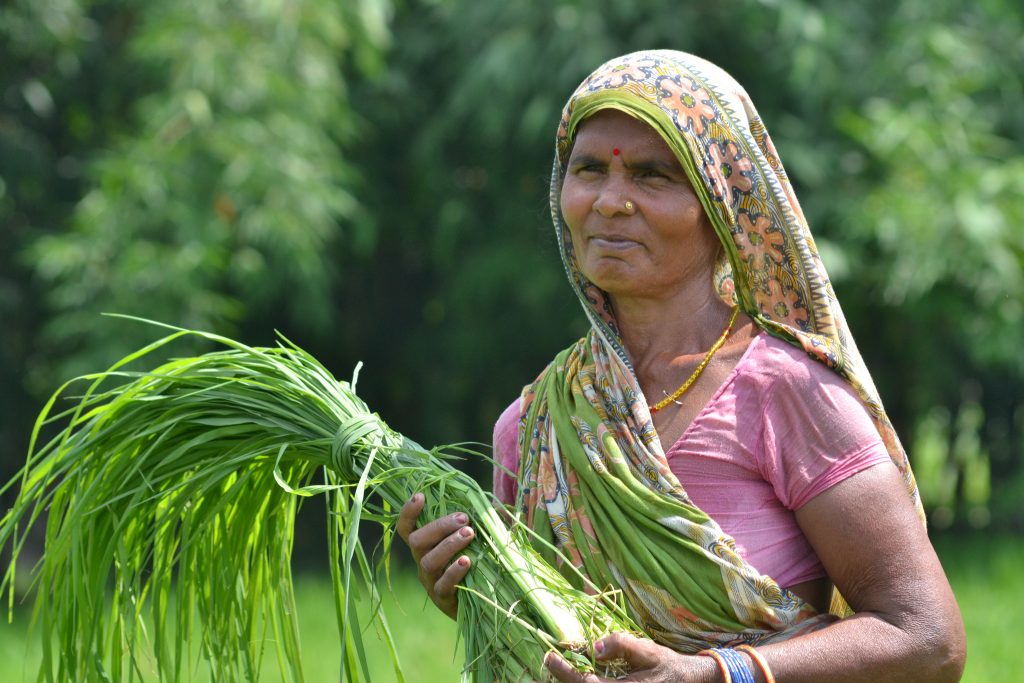South Asia faces multiple food security challenges, one of which being its extreme vulnerability to climate change. Millions living in the region are expected to be affected by water stress, yield loss, and other climate disasters caused by rising temperatures. Technological innovations can in important tool in ensuring food and livelihood security in the region, but social inclusivity is key to promoting the large-scale adoption of new technologies and practices.
Women’s participation in agricultural activities is increasing over time, but many still have limited capacity to contribute to farm decision-making. They may also have limited control over and access to resources such as credit, extension services and markets. The CGIAR Research Program on Climate Change, Agriculture and Food Security (CCAFS) has developed and piloted the use of climate-smart villages (CSVs) in the Indian states of Bihar and Haryana to test climate-smart agriculture options for managing climate-related risks and promoting gender equality in agricultural production.
As climate change disproportionately affects poor and socially marginalized groups, including women, it is important to understand the ways in which the climate-smart approach helps to address specific climate change adaptation challenges. However, there are few studies to date focusing on this question.
In an attempt to fill this gap, a new study carried out as part of the CCAFS project on Climate-Smart Agriculture analyzes the extent to which the climate-smart village approach can contribute to establishing greater gender equality across the agricultural, political, social and economic sectors. The study introduces a Gender Empowerment Index for climate-smart villages, based on measurable indicators. It also documents the gender gap by mapping differences in empowerment levels across selected climate-smart villages and other villages across India’s eastern and western Indo-Gangetic Plains.
Read the full article “Does climate-smart village approach influence gender equality on farming households? A case of two contrasting ecologies in India” in Climatic Change.
The research was supported by the CGIAR Research Program on Climate Change, Agriculture and Food Security (CCAFS).

Check out other recent publications by CIMMYT researchers below:
- When the going gets tough: performance of stress tolerant maize during the 2015/16 (El niño) and 2016/17 (la niña) season in Southern Africa. 2018. Setimela, P.S., Gasura, E., Thierfelder, C., Zaman-Allah, M., Cairns, J.E., Prasanna, B.M. In: Agriculture, Ecosystems and Environment v. 268, p. 79-89.
- Potassium supplying capacity of diverse soils and K-use efficiency of maize in South Asia. 2018. Saiful Islam, Timsina, J., Muhammad Salim, Majumdar, K., Gathala, M.K. In: Agronomy v.8, no. 7, art. 121.
- Improvement of power tiller operated seeder for maize planting. 2018. Muhammad Arshadul Hoque, Gathala, M.K. In: Fundamental and Applied Agriculture v. 3, no. 2, p. 474–479.
- Climate change impact on Mexico wheat production. 2018. Hernandez-Ochoa, I.M., Asseng, S., Kassie, B.T., Wei Xiong, Robertson, R., Pequeño, D. N. L., Sonder, K., Reynolds, M.P., Md Ali Babar., Molero, A., Hoogenboom, G. In: Agricultural and Forest Meteorology v. 263, p. 373-387.
- Genetic dissection of grain zinc concentration in spring wheat for mainstreaming biofortification in CIMMYT wheat breeding. 2018. Velu, G., Singh, R.P., Crespo-Herrera, L.A., Juliana, P., Dreisigacker, S., Valluru, R., Stangoulis, J., Sohu, V.S., Gurvinder Singh Mavi, Vinod Kumar Mishra, Balasubramaniam, A., Chatrath, R., Gupta, V., Gyanendra Pratap Singh, Joshi, A.K. In: Nature Scientific reports v. 8, art. 13526.
- Re-assessing nitrous oxide emissions from croplands across Mainland China. 2018. Qian Yue, Ledo, A., Kun Cheng, Albanito, F., Lebender, U., Sapkota, T.B., Brentrup, F., Stirling, C., Smith, P., Jianfei Sun, Genxing Pan, Hillier, J. In: Agriculture, Ecosystems and Environment v. 268, p. 70-78.
- Crop model and weather data generation evaluation for conservation agriculture in Ethiopia. 2018. Liben, F.M., Wortmann, C.S., Haishun Yang, Lindquist, J.L., Tsegaye Tadesse, Dagne Wegary Gissa. In: Field Crops Research v. 228, p. 122-134.
- Assessing sustainability in agricultural landscapes: a review of approaches. 2018. Eichler Inwood, Sarah E., Lopez-Ridaura, S., Kline, K.L., Gerard, B., Gardeazabal Monsalue, A., Govaerts, B., Dale, V.H. In: Environmental Reviews v. 26, no. 3, p. 299-315.
- Unpacking the push-pull system: assessing the contribution of companion crops along a gradient of landscape complexity. 2018. Kebede, Y., Baudron, F., Bianchi, F., Tittonell, P. In: Agriculture, Ecosystems and Environment v. 268, p. 115-123.
- Genetic relationships and heterotic structure of quality protein maize (Zea mays L.) inbred lines adapted to eastern and southern Africa. 2018. Dagne Wegary Gissa, Vivek, B., Labuschagne, M. In: Euphytica v. 214, art. 172.
 Climate adaptation and mitigation
Climate adaptation and mitigation 

